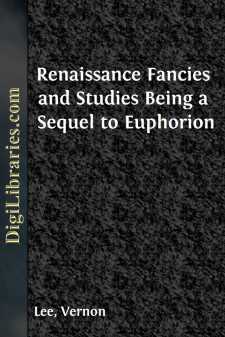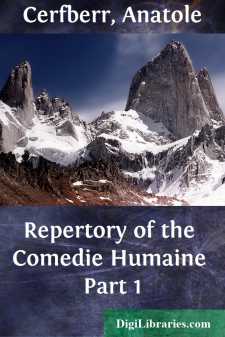Categories
- Antiques & Collectibles 13
- Architecture 36
- Art 48
- Bibles 22
- Biography & Autobiography 813
- Body, Mind & Spirit 142
- Business & Economics 28
- Children's Books 15
- Children's Fiction 12
- Computers 4
- Cooking 94
- Crafts & Hobbies 4
- Drama 346
- Education 46
- Family & Relationships 57
- Fiction 11828
- Games 19
- Gardening 17
- Health & Fitness 34
- History 1377
- House & Home 1
- Humor 147
- Juvenile Fiction 1873
- Juvenile Nonfiction 202
- Language Arts & Disciplines 88
- Law 16
- Literary Collections 686
- Literary Criticism 179
- Mathematics 13
- Medical 41
- Music 40
- Nature 179
- Non-Classifiable 1768
- Performing Arts 7
- Periodicals 1453
- Philosophy 64
- Photography 2
- Poetry 896
- Political Science 203
- Psychology 42
- Reference 154
- Religion 513
- Science 126
- Self-Help 84
- Social Science 81
- Sports & Recreation 34
- Study Aids 3
- Technology & Engineering 59
- Transportation 23
- Travel 463
- True Crime 29
Sort by:
by:
Vernon Lee
"Panis Angelicus fit panis hominum. O res mirabilis, manducat Dominum Pauper, Servus et Humilis." These words of the Matins of the Most Holy Sacrament I heard for the first time many years ago, to the beautiful and inappropriate music of Cherubini. They struck me at that time as foolish, barbarous, and almost gross; but since then I have learned to think of them, and in a measure to feel of...
more...
CHAPTER I--THE PROBLEM FOR THE FINE ARTS Art in Italy and Greece—The Leading Phase of Culture—Æsthetic Type of Literature—Painting the Supreme Italian Art—Its Task in the Renaissance—Christian and Classical Traditions—Sculpture for the Ancients—Painting for the Romance Nations—Mediæval Faith and Superstition—The Promise of Painting—How far can the Figurative Arts express Christian...
more...
CHAPTER I. THE SPIRIT OF THE RENAISSANCE. Difficulty of fixing Date—Meaning of Word Renaissance—The Emancipation of the Reason—Relation of Feudalism to the Renaissance—Mediæval Warnings of the Renaissance—Abelard, Bacon, Joachim of Flora, the Provençals, the Heretics, Frederick II.—Dante, Petrarch, Boccaccio—Physical Energy of the Italians—The Revival of Learning—The Double...
more...
CHAPTER I THE SPANISH HEGEMONY Italy in the Renaissance—The Five Great Powers—The Kingdom of Naples—The Papacy—The Duchy of Milan—Venice—The Florentine Republic—Wars of Invasion closed by the Sack of Rome in 1527—Concordat between Clement VII. and Charles V.—Treaty of Barcelona and Paix des Dames—Charles lands at Genoa—His Journey to Bologna—Entrance into Bologna and Reception...
more...
Renascence and Other Poems Renascence All I could see from where I stoodWas three long mountains and a wood;I turned and looked another way,And saw three islands in a bay.So with my eyes I traced the lineOf the horizon, thin and fine,Straight around till I was comeBack to where I'd started from;And all I saw from where I stoodWas three long mountains and a wood.Over these things I could not...
more...
The partnership of Edmond and Jules de Goncourt is probably the most curious and perfect example of collaboration recorded in literary history. The brothers worked together for twenty-two years, and the amalgam of their diverse talents was so complete that, were it not for the information given by the survivor, it would be difficult to guess what each brought to the work which bears their names. Even...
more...
by:
Lilyan Stratton
The magic little word "Reno" makes a smile creep over the face of anyone who hears it mentioned, as a rule in recognition of the one thing for which it is known. I have smiled myself with the rest of the world in the past; in the future my smile will have a different meaning. I have lived in Reno. I have felt the pulse of its secret soul, and have learned to understand its deeper meaning, and...
more...
by:
Bertram Mitford
Prologue. “Just consider! You would soon get to hate me. I should be the ruin of you.” Thus the owner of the bright, sparkling face which was turned, half mockingly, half ruefully, upon that of her companion. Looking out killingly from under the broad-brimmed hat, the dark, lustrous eyes seemed to melt into his. “How can you say such a thing?” was the reply, in the deep, half-tremulous tone of...
more...
by:
Anatole Cerfberr
TRANSLATOR'S PREFACE "Work crowned by the French Academy" is a significant line borne by the title-page of the original edition of Messieurs Cerfberr and Christophe's monumental work. The motto indicates the high esteem in which the French authorities hold this very necessary adjunct to the great Balzacian structure. And even without this word of approval, the intelligent reader needs...
more...
by:
Anatole Cerfberr
LA BASTIE LA BRIERE (Ernest de), member of a good family of Toulouse, born in 1802; very similar in appearance to Louis XIII.; from 1824 to 1829, private secretary to the minister of finances. On the advice of Madame d'Espard, and thus being of service to Eleonore de Chaulieu, he became secretary to Melchior de Canalis and, at the same time, referendary of the Cour des Comptes. He became a...
more...











